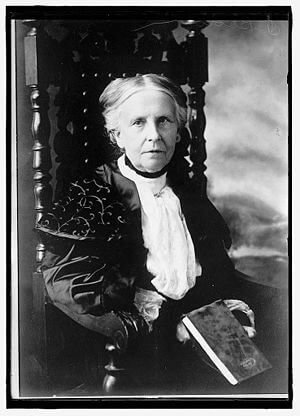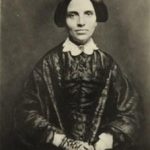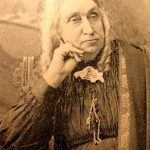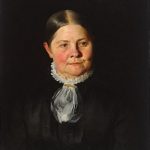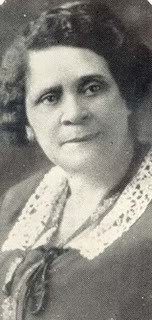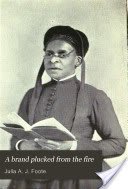First Ordained Woman Minister and Social Reformer
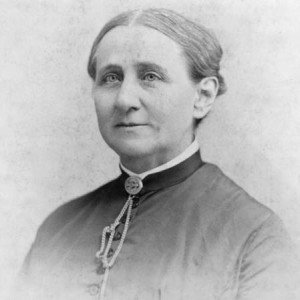 Antoinette Brown Blackwell (1825–1921), was the first woman to be ordained as a minister in the United States. She was also a well-versed public speaker on the social reform issues of her time, and used her religious faith in her efforts to expand women’s rights. Always ahead of her time, she wrote prolifically on religion and science, constructing a theoretical foundation for sexual equality.
Antoinette Brown Blackwell (1825–1921), was the first woman to be ordained as a minister in the United States. She was also a well-versed public speaker on the social reform issues of her time, and used her religious faith in her efforts to expand women’s rights. Always ahead of her time, she wrote prolifically on religion and science, constructing a theoretical foundation for sexual equality.
Early Years
Antoinette Louisa Brown was born in Henrietta, New York on May 20, 1825, the daughter of Joseph and Abby Morse Brown. From childhood on she preferred writing and men’s farm chores to housework. Brown’s parents were very religious and, during her childhood, they were inspired by the many of the revivals sweeping through upstate New York at that time.
One Sunday when Antoinette was eight, a visiting preacher challenged the people of her family’s church to give their lives to God. The following week Antoinette told her Sunday School teacher that she wanted to be a minister. The teacher firmly cautioned her that girls could not be ministers.
At the age of sixteen, after completing her requisite early schooling at Monroe County Academy (1838-1840), Brown became a schoolteacher. However, she was not content with that profession and soon set her sights on a degree from Oberlin College in Ohio. In four years of teaching, she saved enough money to cover the cost of her tuition.
Supported by her parents, who believed in equal education for men and women, Brown enrolled at Oberlin in 1846. After receiving her literary degree (the prescribed course for women students) in 1847, Brown requested to be admitted to the theology department in order to train for the ministry.
Although Oberlin espoused education for women, the administration opposed the idea of a female engaging in any kind of theological training. Brown’s family were also against this. Brown was adamant and finally, as a compromise, the faculty allowed her to attend the lectures and to accept invitations to preach, but she would not receive formal recognition for her studies.
While she was at Oberlin, Brown became increasingly involved in the women’s rights, temperance and anti-slavery movements. Despite widespread opposition to public speaking by women, in 1847 Brown
delivered several speeches on temperance in Ohio, and lectured about women’s rights at the Baptist church in her hometown of Henrietta, New York.
However, during the three years that she spent studying theology she was constantly reminded by both faculty and fellow students that the Bible did not approve of women speaking in church. She had to get special permission from her professor and from the Theological Literary Society to speak in class in order to present essays.
In one of these essays, which was published in the Oberlin Quarterly Review, Brown claimed that, in asking women to be silent in church, St. Paul meant only to warn against excesses in public worship. This is where her understanding of what may now be popularly called feminist theology takes shape. She insisted that the Bible’s pronouncements about women were not applicable to the 19th century.
In 1850, Antoinette Brown completed her theological studies at Oberlin College. At the commencement, however, the faculty refused to recognize her studies and withheld the degree in theology. Nor was she given a license to preach.
Social Reform
For the time being Brown decided to put her ministerial ambitions on hold. She traveled to Worcester, Massachusetts, to attend the first National Women’s Rights Convention, giving a speech that was well received. This served as the beginning of a career as an independent lecturer. She spoke throughout Pennsylvania, Ohio and New England on social reform issues, and preached sermons on Sundays when invited.
In 1851 she applied for a license to preach in the Congregational Church, but was denied because she was a woman. In 1852 the Church relented and gave Brown a license to preach, but she was not ordained. Sometimes Brown preached in Unitarian churches, including those of Theodore Parker and William Ellery Channing.
In the fall of 1852 Brown received an invitation to serve as minister for the Congregational Church in rural South Butler, New York. She accepted the call, turning down an offer from Horace Greeley and Charles Dana for a substantial salary if she would hold Sunday services in a New York City hall.
Brown temporarily suspended her vast speaking engagements. In an 1852 letter to her friend (and later sister-in-law) Lucy Stone,/a>, Brown recounted “speaking 18 times in 19 days, in Wayne Co. [New York].” During that lecture tour she missed a stagecoach, walked 7 1/2 miles in a snow storm, “took a cold water wash when I got home, and the next morning got up as well as ever without even a stiff joint.”
Because the Congregational clergy were reluctant to ordain a woman as a minister, on September 15, 1853 Brown was ordained by a socially radical Methodist minister named Luther Lee, a passionate and vocal advocate of women’s right to theological education and leadership.
At her ordination, Lee delivered a sermon testifying to Brown’s suitability as a preacher and her calling from God:
If God and mental and moral culture have not already qualified her… All we are here to do is to subscribe our testimony to the fact that in our belief our sister in Christ, Antoinette L. Brown, is one of the ministers of the New Covenant, authorized, qualified and called by God to preach the gospel of his Son Jesus Christ.
On this ceremony rested her claim to be the first woman ordained by a regular Protestant denomination in the United States. Although later historians would question whether this was the first ordination of a woman, at the time it was recognized as such, and for all of her life Brown was known as the first ordained woman.
Antoinette Brown entered her ministry with enthusiasm. “The pastoral labors at S. Butler suit me even better than I expected,” she wrote, “and my heart is full of hope.” Soon thereafter she officiated at a marriage ceremony in Rochester, New York, the first wedding performed by an American woman minister.
Chosen by her church as a delegate, Brown became the center of a controversy at the 1853 World’s Temperance Convention, where fellow delegates received her credentials but shouted her off the platform, refusing to permit a woman to speak. Supported by members of the Women’s Rights Convention meeting at the same time, she brought a measure of disgrace to the male clergy in attendance.
Brown was also unprepared for the openly critical attitudes of women in her own parish, who had been long conditioned to regard the minister as a father figure. Even her intimate friends in the women’s rights movement –
Lucy Stone, Elizabeth Cady Stanton and Susan B. Anthony – did not think it worthwhile for women to expend their efforts forcing entrance into an institution as corrupt and outdated as the church.
Unfortunately, Luther Lee’s unqualified support was not enough to provide Brown with a sustainable lifestyle at South Butler. In the meantime Brown had no one to counsel her in a deepening emotional crisis, and growing religious doubts increasingly troubled her. After just ten months, she resigned from the South Butler church in July 1854. It would be ten years before another woman was ordained.
A short period of rest at her family’s farm in Henrietta improved Brown’s health. Anthony encouraged her to help with the campaign for women’s right to own property in New York State. Feeling that she was once again needed, Brown began lecturing again. However, Brown was steadfast in her belief that women’s active participation in religion could serve to further their status in society.
Beginning in 1855, Brown spent a year doing volunteer work with Abigail Hopper Gibbons in the slums and prisons of New York City. Brown studied the causes of mental and social disorders, and how these affected the lives of women in poverty. She wrote a series of articles for Horace Greeley’s New York Tribune, the first of which focused on the “shadow of poverty” hovering over the streets of the city. She published these collected articles as the book Shadows of Our Social System in 1856.
During this time Antoinette Brown was courted by fellow reformer Samuel Charles Blackwell, a real estate dealer and hardware salesman from Cincinnati, Ohio, and the brother of Lucy Stone’s husband, Henry Blackwell. Samuel and Henry also had famous sisters: doctor and educator Emily Blackwell and Elizabeth Blackwell, the first woman to receive a medical degree in the United States.
Marriage and Family
On January 24, 1856, at the fieldstone house in Henrietta where she had spent her childhood, Antoinette Brown married Samuel Blackwell. Between 1856 and 1869 she bore seven children. Of the five daughters who survived to adulthood, Florence became a Methodist minister, Edith and Ethel became physicians, and Agnes an artist and art teacher. Grace suffered from depression which prevented her from taking on challenging work.
After the wedding, Brown moved with the extended Blackwell family – many of whom were active in reform movements – from Cincinnati to New York City and later to New Jersey. Except for brief periods of lecturing and travel and an interlude in New York City between 1896 and 1901, Brown resided in various communities in northern New Jersey for the rest of her life.
Brown discontinued her lecturing career after domestic duties took up most of her time. Writing became her new outlet for initiating positive change for women; writing articles for the Woman’s Journal, edited by Lucy Stone and Henry Blackwell. In her works Brown encouraged women to seek masculine professions, and asked men to share household duties, yet she retained the belief that women’s primary role was care of the home and family.
During the Civil War Brown, Susan B. Anthony and Elizabeth Cady Stanton founded the Women’s National Loyal League in support of African American emancipation and enfranchisement. Unlike many of her peers, Brown cared more about improving women’s status in society than for suffrage (the right to vote). She believed that suffrage, would have little positive impact on women’s lives unless it was coupled with leadership opportunities.
Brown, contrary to many of her fellow suffragists, supported the passage of the Fourteenth Amendment to the Constitution, which granted suffrage to all men irrespective of color, but not for women. In 1869, Brown and Lucy Stone separated from other women’s rights activists to form the American Woman Suffrage Association.
After the Civil War Blackwell lectured on women’s struggle for equality and the right to vote. Though she had a sympathetic husband she still struggled to combine marriage and her “intellectual work.” In an 1873 paper for the Association for the Advancement of Women she advocated part time work for married women, with their husbands helping out with child care and housework.
As her children got older, she wrote and published several books about science and philosophy, including Studies in General Science (1869), The Physical Basis of Immortality (1876) and The Philosophy of Individuality (1893). In 1871 she published a novel The Island Neighbors, and in 1902 a book of poetry entitled Sea Drift; or Tribute to the Ocean.
In her book The Sexes Throughout Nature (1875), Brown argued that evolution resulted in two sexes that were different but equal, challenging Charles Darwin and Herbert Spencer whom she considered to be the most influential men of her day, aware that she would be considered presumptuous for criticizing evolutionary theory. In 1881 she was one of the few women elected to membership in the American Association for the Advancement of Science.
After her husband’s business failed in the late 1870s, Brown returned to the lecture circuit, again traveling throughout the country. At women’s rights and suffrage conventions, she was frequently called upon to speak and to officiate at or assist in religious services. In 1878 Oberlin College awarded Brown an honorary Master’s Degree.
Brown had avoided aligning herself with any religious sect until she and her husband began visiting Unitarian churches in New York City in early 1878. She applied to the American Unitarian Association and was recognized as a minister later that year. Discouraged by the lack of opportunities that suited her family situation, by the end of 1879 she had decided to settle for occasional preaching.
Late Years
Antoinette Brown was elected president of the New Jersey Woman Suffrage Association in 1891, and helped found the American Purity Association, which supported efforts to prevent state regulation of prostitution and to reform the social relations of the sexes. She also lectured on behalf of the poor of New York City.
In 1893 she attended the Parliament of Religions during the Columbian Exposition in Chicago, where she stated:
Women are needed in the pulpit as imperatively and for the same reason that they are needed in the world – because they are women. Women have become – or when the ingrained habit of unconscious imitation has been superseded, they will become – indispensable to the religious evolution of the human race.
Samuel Blackwell died in October 1901 and a year later, Brown spoke at the funeral of fellow suffragist and friend Elizabeth Cady Stanton.
Yet, in spite of her advancing age and the deaths of close friends and reform allies, Brown continued to participate in suffrage activities, where she was acknowledged with increasing admiration. While traveling on a train to a NAWSA convention in 1905, she and other suffragists were greeted along the way by admirers, asked to give speeches and interviews with reporters, and given ovations and praise.
Brown also continued her leading role in religion throughout her life. In 1902 she helped found the Unitarian Society of Elizabeth, New Jersey, serving as its minister. She was also instrumental in establishing the All Souls Unitarian Church in Elizabeth, where she served as pastor emeritus from 1908 until her death.
Brown attended women’s suffrage conventions until she was well into her eighties. After the NAWSA Convention of 1906, Brown and Anne Fitzhugh Miller spoke at a hearing before the Senate Committee on Woman Suffrage in Washington, DC. Oberlin granted Brown an honorary Doctoral Degree in 1908.
In 1920, at age 95, Antoinette Brown Blackwell – the last surviving delegate to the first national women’s rights convention at Worcester, Massachusetts in 1850 – saw the passage of the Nineteenth Amendment to the Constitution, which gave women the right to vote. She was one of the very few pioneer suffragists who voted on November 2, 1920, casting her ballot for Warren G. Harding.
Antoinette Brown Blackwell died on November 5, 1921 in Elizabeth, New Jersey at age 96. Her remains were cremated.
In 1975 the United Church of Christ began awarding the Antoinette Brown Award to ordained UCC women who “exemplify the contributions that women can make through ordained ministry…”
SOURCES
Wikipedia: Antoinette Brown Blackwell
American National Biography: Antoinette Louisa Brown Blackwell
